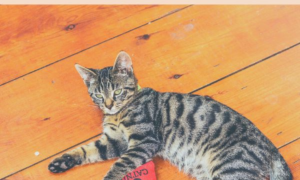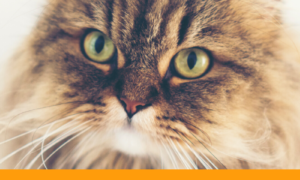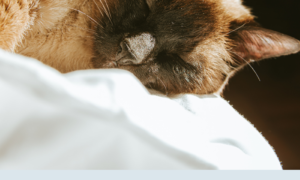Is your cat a senior cat? How do you determine if your cat is a senior cat? Sources vary as to when a cat is considered senior, most agree that by the time a cat is seven years of age, he is considered “senior.”
The American Veterinary Medical Association equates a seven-year-old cat to 54 years in human age; 10 cat years is equal to 63 human years; 15 cat years is equal to 78 human years and 20 cat years is equivalent to 97 human years!!!
We encounter certain physical challenges and changes as we age, so do cats. Fortunately, advances in veterinary medicine and improved care have given pets the potential for a much longer life span than ever before.
As your cat ages, the care and attention he requires change. Scheduling routine semiannual veterinary visits will aid in early detection and treatment of health issues.
Reduced Sight and Hearing
Throughout the normal aging process for cats, it’s not unusual for them to lose some of their vision and hearing. Cats with limited eyesight or even blindness can still maneuver through familiar environments. Minimize rearranging furniture to make it easy for your cat to navigate.
Other health issues to consider with a senior cat include heart, kidney, thyroid or liver disease, along with cancer and arthritis. In fact, according to the anticruelty.org web site, cancer accounts for nearly half of the death of pets over the age of 10.
It’s no surprise that older cats tend to become less active, and for some pets, this can be attributed to the onset of arthritis.
Consult your vet if your cat is suffering from this disease so he/she can advise on proper care and/or medication. The use of orthopedic pet beds, raised feeding platforms and ramps may greatly assist your arthritic pet.
Change In Weight
Don’t overlook your senior cat’s weight, either. Obesity is a common issue in older pets. Obviously, with age comes less activity and the need for fewer calories. Obesity not only puts undue stress on joints, it can also put your at an increased risk for skin problems, high blood pressure and heart disease.
But what if your senior cat loses weight? Unexplained and sudden weight loss is a cause for concern and can be attributed to hyperthyroidism diabetes and kidney disease.
Behavior Changes
Additionally, sudden changes in your cat’s behavior as he ages can point to cognitive dysfunction (much like senility in humans). You may notice increased vocalization, loss of house training or changes in sleeping habits.
If you notice any of these symptoms in your senior pet –consult your veterinarian as soon as possible. The more time, attention and care you put into your cat’s health can lead to more time and unconditional love in return from him to you!







